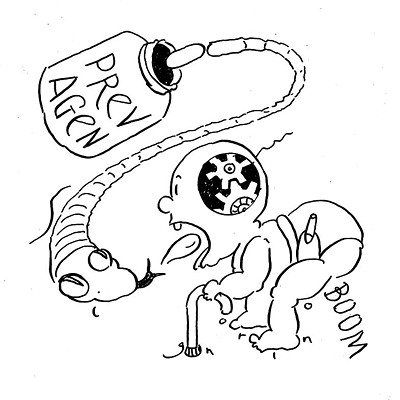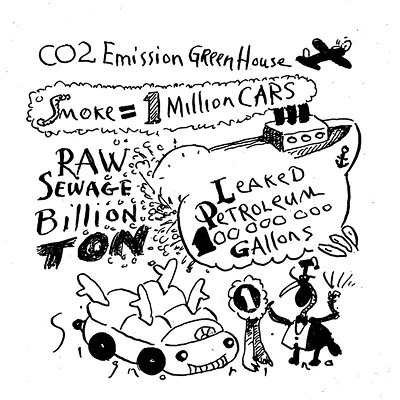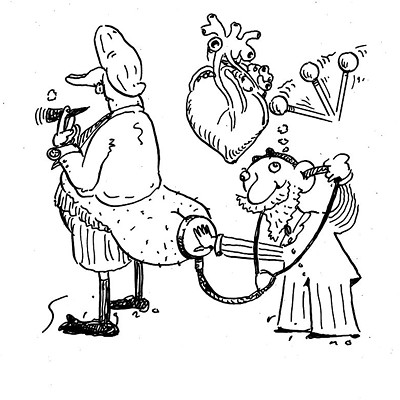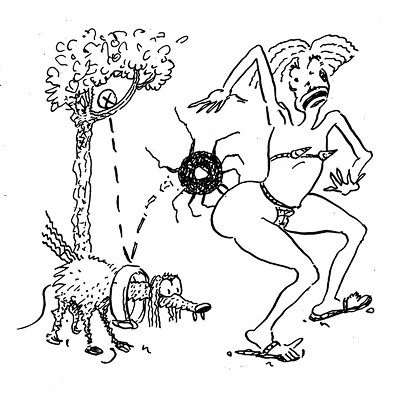I consider myself a smart person, but why are smart people so negative? We constantly ask, “What’s the point? Why are we here?”—questions with pretty depressing answers, if you ask me. The average joe doesn’t feel bad about much—he just thinks, “Thank god it’s Friday! And thank god for bacon!” Can intelligence cause depression? Nietzsche was obviously a brilliant but bitter person, and we can also include Mozart, Newton, Tesla, etc., as guys who didn’t lead very pleasant lives despite their intelligence. Surely this isn’t all a coincidence? —Marcos San Juan, Madrid
YOU’RE being too negative, Marcos. Much as the dim might prefer to believe otherwise, research has generally suggested that intelligence correlates, if only mildly, with greater happiness—the tortured-genius meme is without statistical foundation.
Almost.
Historically, evidence for this alleged phenomenon has been overwhelmingly anecdotal, cemented in the popular consciousness by a steady stream of Oscar-bait biopics. Thanks to A Beautiful Mind it’s easy to picture the schizophrenic John Nash arguing with his nonexistent roommate; if The Imitation Game is anything to go by, Alan Turing was depressed well before he had extremely good reason to be (read: involuntary chemical castration).
With these outsize examples on display, it’s perhaps understandable that many people wondering why they’re so unhappy will conclude: Because I’m so goddamn smart, that’s why.The most brilliant among us, it’s regularly suggested, are uniquely doomed to comprehend the limitless expanse of the universe, and, as a result, to confront our own inconsequential place within it. This has loosely been termed existential depression, and is supposed to be especially bad among bright kids, whose advocates may propose they need a regimen of “prescribed hugs.”
I’m certainly not cranky enough to come out against hugging children. Empirically speaking, though, there isn’t much here. Research over the last 50 years has demonstrated no positive link between intelligence and being depressed or schizophrenic, and has often suggested the reverse. A 1998 collection of surveys from 11 countries found educational attainment and intelligence correlated with marginally happier populations. A 1956 study of former U.S. soldiers found no relationship between scores on intelligence tests at induction and later psychiatric health. Danish research from 2011 found that both depressed and bipolar patients had, before the onset of their illness, slightly lower average IQ scores than the healthy control population. A 2004 survey of data for 50,000 Swedish subjects reported that low IQ was associated with greater risk of severe depression and schizophrenia; subjects with average IQ scores were more likely to later become schizophrenic than those with high scores.
Other research has suggested that kids’ intelligence isn’t a particularly strong predictive factor when it comes to adolescent depression at least: more meaningful, statistically, are family history of affective illness, experience of parental loss, and, worryingly, simply being a girl. (Does this result from a growing awareness of oppressive social constructs? Despondence over the inability to pee standing up? More research is clearly needed.)
If there’s a blip on the radar, it’s bipolar disorder. Shrinks have suspected a connection between IQ and bipolarity for some time, but the data hasn’t really been there. In 2005, though, a Finnish study reported that high math scores on IQ tests in early adulthood correlated with later diagnosis as bipolar, and a recent large-scale study of Swedish records found that kids with excellent high school grades were much more more likely to be diagnosed as bipolar in adulthood.
There’s also the supposed link between creativity and craziness. Intuitively this one seems believable: the story of Van Gogh cutting off his ear to give to a prostitute was my own teenage standard for the ultimate tortured-artist response to girl trouble. Evidence has since surfaced, though, suggesting Van Gogh might actually have lost the ear in a fight with his sword-wielding pal Paul Gauguin, whom he may have been a little too into. Romance or bromance, love’s a bitch.
Studies of creativity and mental health haven’t been terribly consistent, which is possibly unsurprising given how inherently difficult the trait is to define. In 2011, for instance, a group of Swedish researchers reported that patients with schizophrenia or bipolar disorder (as well as their healthy siblings) were overrepresented among people with creative jobs. But a later study by the same group, using a much larger data set, found that those in creative professions, with one exception, weren’t particularly likely to suffer from psychiatric illness.
The exception? Writers. The Swedish group found that being an author was associated with increased likelihood of depression, anxiety, schizophrenia, bipolarity, substance abuse, and suicide. Earlier studies had drawn similar conclusions, but relied on very small sample sizes and lots of self-reporting. Then again, in that study connecting good grades with bipolar disorder, the two subjects that showed a particularly strong link were Swedish and music, which to the researchers supported ongoing suspicions about bipolarity and creativity. To my fellow writers, and I suppose to all those creative-minded Swedes out there, all I can say is: keep it together as best you can, and we’ll hold out for further data.
























